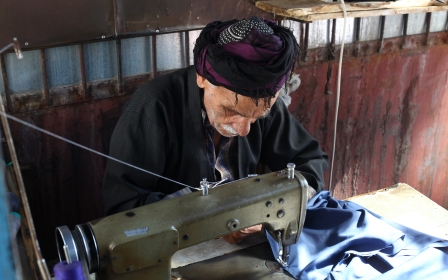In pictures: A journey into the light - how a blind Syrian man found purpose in faith
In his earliest memories, darkness was normality for Hasan Fadel, a 29-year-old Syrian from the village of Hassarjah in rural Idlib. As an infant, he thought everyone around him was blind like him. It was the lack of fear and hesitation in the voices of his siblings as they moved around his family home that alerted him to the fact that he was not the same. “It was unlike what I was feeling and, little by little, I learned that I am different, that I do not have the most important sense a person can have - which is sight,” he says. It was the small things associated with his disability that made him most self-conscious as a child, such as his parents asking one of his brothers to answer the door instead of him. That combined with the bullying he suffered at the hands of children in the neighbourhood made him reclusive, rarely leaving the safety of home except with his family. (All pictures: Abdul Razzak el-Shami/MEE)
Hasan has been blind since shortly after his birth and his mother blames the impairment on a damaged optic nerve that became apparent soon after the delivery. The young boy would not respond to visual stimuli and has remained in that state since.
Despite his visual impairment, Hasan’s family say he was an eager student with a “thirst for knowledge”, learning to read braille by the time he was six. Even though finances were tight and the family could not afford everything required to help Hasan through his studies, the young man excelled through high school. His dreams of graduating, however, were brought to a halt by the outbreak of the Syrian civil war.
The fighting soon arrived at Hasan’s doorstep and he, along with his family, were forced to flee when Syrian government planes began to bombard his village. When rebel fighters took over the city of Idlib in 2015, the family moved there, renting a house near a mosque. The sound of the Quran's verses audible from the mosque during government bombardment of the city became a comfort to Hasan. The verses he heard during the violence helped him overcome the trauma associated with war. “I felt relaxed and reassured when I would hear the Quran and repeat its verses,” he says. He decided then to learn the Muslim holy book, which has 6,346 verses, by heart.
Hasan joined classes at his local mosque aimed at memorising the Quran but unlike other students, who could read, he relied solely on his ability to listen to and memorise what his instructor was saying. His teachers said they were taken aback by Hasan’s prodigious ability to remember the verses and chapters he was hearing. The young man needed only to listen to a page once or twice, before he had made it stick in his memory. Within a year, he had memorised the entire book.
Hasan can often be seen walking around the streets of Idlib, carrying a recorder and bluetooth speaker, which he uses to listen to the Quran and practise his recitations. His achievement has been transformational not only at a spiritual level, but also in the way people treat him. “The local residents used to look at me with pity and as someone who has special needs,” he says. “That was something that bothered me a lot and had a psychological impact on me.” As news of his feat spread, Hasan noticed that people were beginning to change their behaviour around him, becoming less condescending.
Most Muslims will have memorised a handful of short chapters from the Quran, known as Surah, to perform their prayers and other rites, but memorisation of the entire text is less common. Those who manage to do so earn the honorific hafiz, which literally means "one who preserves" in Arabic. While not a universal practice, those who memorise the holy book with certain Islamic institutions are awarded an ijazah, which roughly translates to licence. The ijazah certifies that a person has reached a level of understanding in a specific field of Islamic studies. In Hasan’s case, his ijazah acknowledges his memorisation of the Quran.
In many cases, earning the status of a hafiz, is the first step towards a career in Islamic scholarship. Someone who has learned the Quran by heart will then move on to the study of the books of hadith, which are sayings and narrations attributed to the Prophet Muhammad. After mastering those, a student will move on to works by classical Islamic jurists, before embarking on their own research. Hasan has no intention of ending his study of religion, and has plans to become an Islamic preacher.
It is not just his religious ambitions that weigh heavily on Hasan’s mind. At 29, he is eager to settle down and start a family. “I hope to have a wife with whom I’ll complete my life’s journey and with her, I hope to have children."
This article is available in French on Middle East Eye French edition.
Middle East Eye delivers independent and unrivalled coverage and analysis of the Middle East, North Africa and beyond. To learn more about republishing this content and the associated fees, please fill out this form. More about MEE can be found here.




